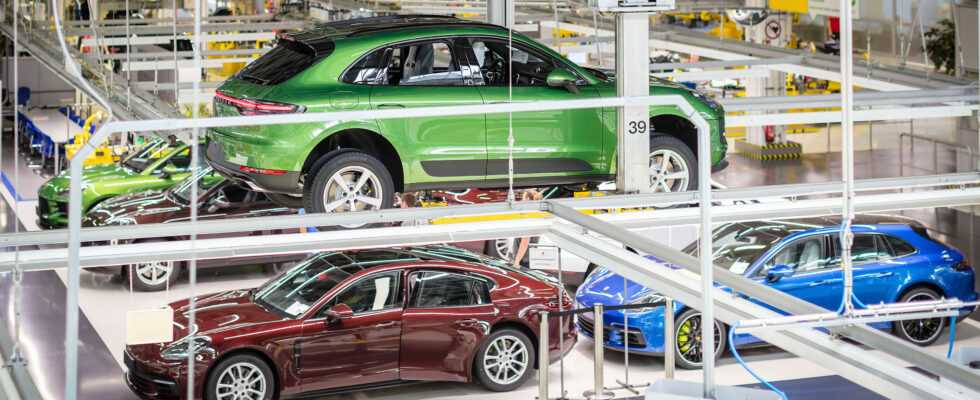(BFM Bourse) – An IPO of Porsche would unlock the potential for revaluation of assets that have hitherto been badly perceived because they are embedded in the entire Volkswagen group. This is the commonly accepted thesis. But the interest of the project (in the air for years and now officially on the table) deserves to be questioned, according to The letter Vernimmen.
“It is a classic when a group feels permanently undervalued to think about the IPO of its most brilliant subsidiary”, without necessarily being the most important in volume of activities. As Vivendi did with UMG or Fiat Chrysler Automobiles with Ferrari. At Volkswagen, the idea has long been in vogue. But since last month, the project has been officially considered by the German car giant.
The purpose of this type of operation is to allow investors to better value separately dissimilar assets, in terms of profitability for example. But on reflection, one can be surprised at this reasoning. “That investors, like modern Saint Thomas, need to see the stock market listing of Porsche AG to confirm its value, is already a first object of surprise”, point out the authors of The Vernimmen letter, in the February 2022 issue. It is a priori the basics of the work of analysts to calculate the intrinsic value of a company taking into account its subsidiaries and, in this case, it is difficult to believe that the market is neglecting in the valuation of Volkswagen a part as important as its iconic subsidiary Porsche. Second largest company in Germany by capitalization, Volkswagen is a priori scrutinized from all angles by analysts and professional investors.
Moreover, ask Pascal Quiry and Yann Le Fur; the authors of The Vernimmen letter, “how will we create value for Volkswagen shareholders, when we sell shares of the nugget of the group to third parties”? Except to manage to sell them at a significantly overvalued price, which is unlikely for an operation of such a large absolute amount (one of the largest European IPOs a priori). Or to reason by analogy: “Can you imagine LVMH listing Louis Vuitton on the stock market”, and seeing its own price progress in the process?
The most likely fallout from the operation is that once Porsche AG is listed, the discount in Volkswagen’s share price compared to the sum of its assets deducted from its debts “will only be more flagrant”. Which will eventually lead either to a complete split (like AXA and Equitable or Atos and Worldline) or to a… buyout of the minority shareholders, that is to say to completely reverse the introductio ! Like Orange at one time buying the various subsidiaries that the operator had introduced on the stock market.
The reasons for Ferrari’s success
The pressure will only be stronger in the case of the Volkswagen group which would find itself, once Porsche AG introduced, with three levels of listing for ultimately the same assets: the family holding company Porsche SE, shareholder of Volkswagen, shareholder of Porsche AG. Not to mention the wacky Audi Group listing: this entity which brings together the pole of “premium” brands outside of Porsche, namely Audi, Lamborghini, Bentley and Ducati, is formally listed, but the free float does not even reach 1% of the capital. .
According to the authors of the Vernimmen, academic research clearly demonstrates that an IPO only really creates value when the process goes as far as the complete demerger of the subsidiary, on the contrary of the listing of a part on the Stock Exchange ( generally minority) of the capital of the latter. “If the Ferrari split has been so successful, it is precisely because the split [d’avec FCA] has been total and that Ferrari has managed to position itself as an ultra-luxury value”, with an average sale price of 0.4 million euros, compared to 0.1 million at Porsche, with a production volume 30 times lower It is only under its conditions that Ferrari could obtain a PER of luxury value (40 times the profits currently).
The “unsatisfactory” governance of the Volkswagen group (the founding family holds 15% of the shares, but 53% of the voting rights and the supervisory board is de facto controlled by an alliance between the family, the employees and the State of Basse -Saxony) makes this development unlikely, advance the feathers of Vernimmen.
References of academic articles:
Anslinger P., Klepper S., Subramaniam S., “Breaking up is good to do”, The McKinsey Quarterly 1999, no 1
Cusatis P., Miles J., Woolridge J., “Restructuring through spin-offs”, Journal of Financial Economics June 1993, vol. 33, No. 3
Guillaume Bayre – ©2022 BFM Bourse
